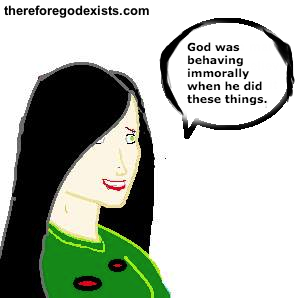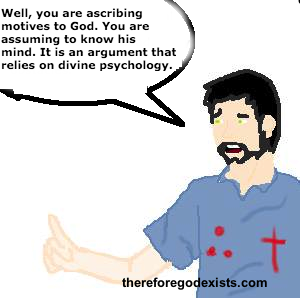 Throughout their poetry, the psalmists would contemplate the character of God. They would marvel about his wisdom, strength, glory, and his righteousness. Even in times of turmoil, they would write what we find in Psalm 145:17. “The LORD is righteous in all His ways And kind in all His deeds.” Psalm 89:14 says, “Righteousness and justice are the foundation of Your throne; Lovingkindness and truth go before You.” God is constantly contrasted against wicked men. While men will deceive us, betray our trust, persecute us without cause, the psalmists believed God is righteous and loving. However, sometimes people may suggest that the actions of God throughout the Old Testament contradict this theme. God is seen as racist, sexist, condemning, permitting or carrying out moral abominations, et cetera. Some think that God is evil in the Old Testament. Is that correct? Does the Old Testament portray God as evil?
Throughout their poetry, the psalmists would contemplate the character of God. They would marvel about his wisdom, strength, glory, and his righteousness. Even in times of turmoil, they would write what we find in Psalm 145:17. “The LORD is righteous in all His ways And kind in all His deeds.” Psalm 89:14 says, “Righteousness and justice are the foundation of Your throne; Lovingkindness and truth go before You.” God is constantly contrasted against wicked men. While men will deceive us, betray our trust, persecute us without cause, the psalmists believed God is righteous and loving. However, sometimes people may suggest that the actions of God throughout the Old Testament contradict this theme. God is seen as racist, sexist, condemning, permitting or carrying out moral abominations, et cetera. Some think that God is evil in the Old Testament. Is that correct? Does the Old Testament portray God as evil?
 Well, first, if we were interested in being philosophically precise, we would have to say that God cannot be evil. A maximally great being must be omnibenevolent. He must be perfect in righteousness. If he were not, then we could conceive of a being who was greater (one who was perfect in righteousness), and that being would be God. If we are going to ask “Does the Old Testament portray God as evil?” the question may need to be altered. It would be something like asking, “Does this paper portray that square as rounded?” You may be able to put the words in the same sentence with one another, but it expresses an incoherent thought. The very idea of God being evil is incoherent. What you would have to say is that the Old Testament does not portray God at all, but only pretends to. So does the Old Testament portray God as evil?
Well, first, if we were interested in being philosophically precise, we would have to say that God cannot be evil. A maximally great being must be omnibenevolent. He must be perfect in righteousness. If he were not, then we could conceive of a being who was greater (one who was perfect in righteousness), and that being would be God. If we are going to ask “Does the Old Testament portray God as evil?” the question may need to be altered. It would be something like asking, “Does this paper portray that square as rounded?” You may be able to put the words in the same sentence with one another, but it expresses an incoherent thought. The very idea of God being evil is incoherent. What you would have to say is that the Old Testament does not portray God at all, but only pretends to. So does the Old Testament portray God as evil?
These Arguments Rely On Divine Psychology
 What would God do? If God did do X, what were his motivations? A helpful (but admittedly imperfect) analogy would be to consider that the police will sometimes attempt to discern the motives of an individual who has been suspected of murder. Was it a crime of passion, or was it premeditated? The former would warrant less severe penal action, while the latter is far more malevolent. Similarly, if you were to discover that Bill was keeping John as a prisoner, you might think that Bill was a malevolent man. However, if you learned that Bill was actually a police officer or a court judge, your interpretation of that imprisonment would change. You would think that Bill was being righteous in imprisoning another man. You have insight into his psychology. But what about divine psychology?
What would God do? If God did do X, what were his motivations? A helpful (but admittedly imperfect) analogy would be to consider that the police will sometimes attempt to discern the motives of an individual who has been suspected of murder. Was it a crime of passion, or was it premeditated? The former would warrant less severe penal action, while the latter is far more malevolent. Similarly, if you were to discover that Bill was keeping John as a prisoner, you might think that Bill was a malevolent man. However, if you learned that Bill was actually a police officer or a court judge, your interpretation of that imprisonment would change. You would think that Bill was being righteous in imprisoning another man. You have insight into his psychology. But what about divine psychology?
 Divine psychology is an attempt to interpret the motives that God has for carrying out a certain event. All arguments that say that God is behaving malevolently assume some sort of divine psychology. Indictments that God is evil based on his actions in the Old Testament assume divine psychology. The indicter is assuming that they know what God’s motives are. Whether God destroys a city, institutes capital punishment, or does something that we otherwise would think is unethical, one is assuming to know the mind of God. To say that something is evil is to say that God has evil motives.
Divine psychology is an attempt to interpret the motives that God has for carrying out a certain event. All arguments that say that God is behaving malevolently assume some sort of divine psychology. Indictments that God is evil based on his actions in the Old Testament assume divine psychology. The indicter is assuming that they know what God’s motives are. Whether God destroys a city, institutes capital punishment, or does something that we otherwise would think is unethical, one is assuming to know the mind of God. To say that something is evil is to say that God has evil motives.
However, if God is perfect in righteousness as the psalmist tells us, then it would follow that everything that emanates from him is good. He does not have evil motives. When he destroys a city or institutes capital punishment, he is performing the duties of a righteous judge rather than of a tyrant or a maniac. The person who claims that God is portrayed as evil in the Old Testament will have to have some insight into divine psychology. They will have to know the mind of God. This argument assumes a burden of proof that seems impossible to bear.
God Destroys Cities
If God is good, why is there evil and suffering in the world? Why are the wicked allowed the flourish without any punishment at all? That is a good question that deserves an answer. If God were going to punish the wicked, what would the punishment look like? There are wicked people in the world and you are calling for their condemnation. Will they slowly perish in their sleep? Will they all be locked in an institution by angelic forces so that they could be “rehabilitated”? When God destroys a city in the Old Testament, we see the answer to the question. There is evil and suffering in the world, and God puts an end to it. But when he does intervene, you say that he is evil. It seems like no matter what God does or how he satisfies your demands, you will still say that he is evil and change your expectations. When he intervenes, you say that he is evil for intervening. When he does not intervene, you say that his absence is evil. When God destroys a city, he is bringing righteous judgment upon wicked men.
The second question with which are confronted is who the wicked are. Are only child molesters wicked? Are only soldiers in an evil army wicked? Why? What makes those soldiers different from American soldiers? The American soldiers were not overcome with propaganda and put in a situation wherein they had to enlist in a wicked army. But what truly makes the soldiers fighting for a good cause different from those fighting for an evil cause? Everybody has the same corruptible heart. In the right circumstances, you could be the one who is perpetrating something that is evil. If you are going to say that God must punish evil, then who will be exempt? So, does the Old Testament portray God as evil? I do not think so. There is evil in the world and God has brought his wrath upon it in his righteousness.
Is God Racist?
God made a special covenant with Abraham and all of his descendants. Those descendants eventually became what is known today as Israel. The narrative of the Old Testament is almost entirely a narrative of God’s interactions with the people of Israel. This has led some people to conclude that God is racist. He is a tribal war-god fighting for the Hebrews and hates everyone else. Well, any basic reading of the main texts of the Old Testament will uproot this hypothesis. The first consideration is that Israel was often the target of God’s wrath. Since Israel had covenant with God, God expected them to not live like the nations surrounding them. When they did, he would bring wrath to them. He said in Jeremiah 3:8 that Israel was like a faithless bride. Israel betrayed God’s trust. Israel was the subject of his wrath. God is not racist nor does he favor the Hebrews. Any reading of the prophets will show that God often brought his wrath against them, wielding their Pagan neighbors.
Second, throughout the Old Testament, we see a promise of the expansion of God’s covenant to include the Gentiles. Of the Messiah in Isaiah 49:6, it says, “It is too small a thing that You should be My Servant To raise up the tribes of Jacob and to restore the preserved ones of Israel; I will also make You a light of the nations So that My salvation may reach to the end of the earth.” This is not one verse tucked away in one of the prophets. This is a major theme in the Old Testament. Consider the narrative of the book of Jonah. Jonah is commanded to go preach to the people of Nineveh. The people of Nineveh were Gentiles. As a result of his prejudice inclinations, Jonah refused. Most of us know what happened from there. The theme of the New Testament is that the Messiah has come and expanded the promise of God to include the Gentiles. The theme of Old Testament eschatology is that the Messiah will come and expand the message to include all people. God is not racist in the Old Testament.
Does God Value Women?
Much of the literature that descends from a patriarchal society will seem striking to the contemporary man. Egalitarianism is the norm in today’s society, and any departure from that is offensive to many people. Of course, even in that patriarchal society, the Old Testament taught that men and women were intrinsically equals. Genesis 1:26-27 introduces this concept of being made in the image of God. Most interpreters believe that the image of God is what separates us from animals. We are rational, moral agents endowed with intrinsic moral worth. In fact, this seems to be the only basis for believing that we have intrinsic moral worth. Consequently, God is not sexist because sexism involves having a lower view of women than of men.
However, the argument that is usually mounted is that God allows something like sexual slavery throughout the pages of the Old Testament, and this is morally inadequate. Well, that is just not the case. Rape is strictly condemned in the Old Testament (Deuteronomy 22:25-27), and sex outside of marriage was condemned (Deuteronomy 22:28-29). These strictures are fundamental to Jewish practice.
As I pointed out in my article Does Islam Allow Sex Slavery?, “[In the Old Testament] Men do not charge into the homes of women who just lost their husbands or sons and molest them. Yet there was no prison system, so what are we to do with them? They are taken as wives. The men are instructed, “It shall be, if you are not pleased with her, then you shall let her go wherever she wishes; but you shall certainly not sell her for money, you shall not mistreat her, because you have humbled her.” The men are commanded to treat their new wives with respect. Further if they are neglected by their husband or divorced, they are freed. If they are divorced, they are also freed (Exodus 21:10-11). These laws may be taken as an expansion of Numbers 31:18, which reads, “But all the girls who have not known man intimately, spare for yourselves.” It may be tempting to read sexual slavery into that verse, but considering the host of laws that forbid it, that interpretation is nullified.”
What About Capital Punishment?
God instituted capital punishment. Some individuals who have soft hearts dislike the idea of capital punishment, and one can certainly sympathize with them. But the reason that they have this intuition is that they think men are the ones who are making that decision. Men are condemning others to death, and how do they have the right to do that? They are just as sinful as the guilty criminals. As Gandalf said in The Fellowship of The Ring, “Many who live deserve death. And many who die deserve life. Can you give it to them? Then do not be so quick to deal out death in judgment.” We cannot give life. We have no right to deal out death. I understand this argument.
But suppose I sentenced somebody to death and then I raised them from the dead. I have power over life and death. Similarly, supposed I gave somebody life (not in the sense of having children, obviously) and then I took it away from them. In this case, we have a very different scenario. We have somebody who has authority over life. We have somebody who created life. The one who creates life has the authority to take life away. Therefore, God has the authority to institute capital punishment. As the Creator of life, he has the authority to take it.
Does The Bible Condone Slavery?
We have already seen that the Bible does not condone sex slavery. But what about slavery, in the modern sense of the word? Africans were hunted and kidnapped from their homes and brought on a big ship in chains to work the fields of the American south. Does the Bible condone anything like that? Well, there are three considerations. First, there is the doctrine of the image of God, as I already alluded to. All people have intrinsic moral worth. Second, the Law forbids kidnapping. Exodus 21:16 reads, “Whoever steals a man and sells him, and anyone found in possession of him, shall be put to death.” Manhunting is an essential ingredient to slavery, and the Bible forbids it.
Third, there are different forms of slavery. In the Old Testament, there was not a developed prison system. There were limited options for what to do with offenders. As already mentioned, one was capital punishment. Other offenders were sentenced to slavery. They would work off their debt for a short period of time. Further, people would sometimes sell themselves into slavery as an escape from poverty. Individuals from surrounding nations would sell themselves into slavery. They sign a temporary contract to work off their debt. After the contract ended, they could stay with their master or leave. So, while the same word (slavery) may be used, to accuse the Bible of slavery in the sense of manhunting and kidnapping is to be guilty of the equivocal fallacy.
There Are Better Arguments For The Truth of Scripture
This moral argument against the truth of Scripture relies very heavily upon one’s own personal moral intuitions, their ability to grasp divine psychology and their ability to interpret ancient sources. Since most of these are misinterpretations or otherwise guilty of some logical fallacy, the argument that God has behaved unethically in the Old Testament is very weak. In contrast, there are very good arguments that the Old Testament is divinely inspired and the word of God. This means that it portrays God as perfect in righteousness and justice.
I made this point in my article How Do You Know That The Bible Is God’s Word? First, the historicity of the New Testament establishes several facts about Jesus which lead us to recognize that the resurrection is a robust hypothesis. If Jesus really did rise from the dead, then the religion that he believed in and left behind is likely to be true. Since that contains the inerrancy of the Old Testament, it would follow that the Old Testament was inspired by God. Second, since Jesus viewed the Scripture as divinely inspired, then we should probably align our beliefs with the one who rose from the dead. Third, the Christian worldview (informed by Scripture) makes sense of reality. In fact, you must assume that the Christian worldview is true to make sense of anything at all. Therefore, the Bible is God’s word. The Old Testament is inspired and accordingly does not portray God as evil.
Agree? Disagree? Leave a comment and tell me.